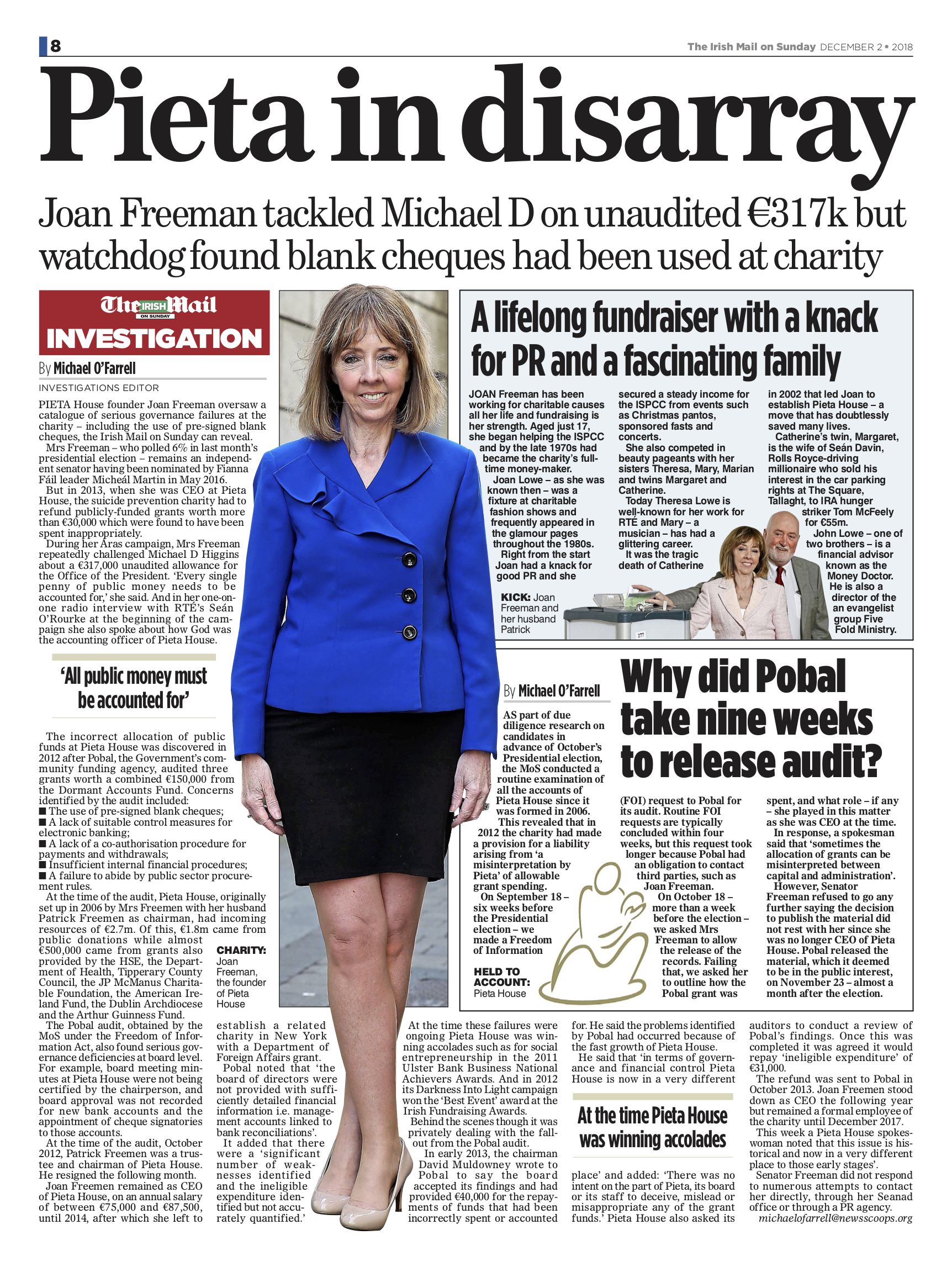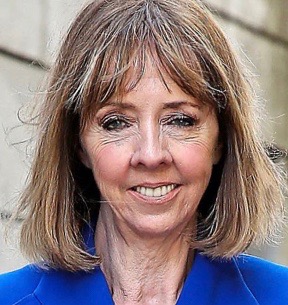By Michael O’Farrell
Investigations Editor
PIETA House founder Joan Freeman oversaw a catalogue of serious governance failures at the charity – including the use of pre-signed blank cheques, the Irish Mail on Sunday can reveal.
Mrs Freeman – who polled 6% in last month’s presidential election – remains an independent senator having been nominated by Fianna Fáil leader Micheál Martin in May 2016.
But in 2013, when she was CEO at Pieta House, the suicide prevention charity had to refund publicly-funded grants worth more than €30,000 which were found to have been spent inappropriately.
During her Áras campaign, Mrs Freeman repeatedly challenged Michael D Higgins about a €317,000 unaudited allowance for the Office of the President.
‘Every single penny of public money needs to be accounted for,’ she said. And in her one-onone radio interview with RTÉ’s Seán O’Rourke at the beginning of the campaign she also spoke about how God was the accounting officer of Pieta House.
The incorrect allocation of public funds at Pieta House was discovered in 2012 after Pobal, the Government’s community funding agency, audited three grants worth a combined €150,000 from the Dormant Accounts Fund. Concerns identified by the audit included:
- The use of pre-signed blank cheques;
- A lack of suitable control measures for electronic banking;
- A lack of a co-authorisation procedure for payments and withdrawals;
- Insufficient internal financial procedures;
- A failure to abide by public sector procurement rules.
At the time of the audit, Pieta House, originally set up in 2006 by Mrs Freemen with her husband Patrick Freemen as chairman, had incoming resources of €2.7m.

Of this, €1.8m came from public donations while almost €500,000 came from grants also provided by the HSE, the Department of Health, Tipperary County Council, the JP McManus Charitable Foundation, the American Ireland Fund, the Dublin Archdiocese and the Arthur Guinness Fund.
The Pobal audit, obtained by the MoS under the Freedom of Information Act, also found serious governance deficiencies at board level.
For example, board meeting minutes at Pieta House were not being certified by the chairperson, and board approval was not recorded for new bank accounts and the appointment of cheque signatories to those accounts.
At the time of the audit, October 2012, Patrick Freemen was a trustee and chairman of Pieta House. He resigned the following month.
Joan Freemen remained as CEO of Pieta House, on an annual salary of between €75,000 and €87,500, until 2014, after which she left to establish a related charity in New York with a Department of Foreign Affairs grant.
Pobal noted that ‘the board of directors were not provided with sufficiently detailed financial information – i.e. management accounts linked to bank reconciliations’.
It added that there were a ‘significant number of weaknesses identified and the ineligible expenditure identified but not accurately quantified.’
At the time these failures were ongoing Pieta House was winning accolades such as for social entrepreneurship in the 2011 Ulster Bank Business National Achievers Awards. And in 2012 its Darkness Into Light campaign won the ‘Best Event’ award at the Irish Fundraising Awards.
Behind the scenes though it was privately dealing with the fallout from the Pobal audit.
In early 2013, the chairman David Muldowney wrote to Pobal to say the board accepted its findings and had provided €40,000 for the repayments of funds that had been incorrectly spent or accounted for. He said the problems identified by Pobal had occurred because of the fast growth of Pieta House.
He said that ‘in terms of governance and financial control Pieta House is now in a very different place’ and added: ‘There was no intent on the part of Pieta, its board or its staff to deceive, mislead or misappropriate any of the grant funds.’
Pieta House also asked its auditors to conduct a review of Pobal’s findings. Once this was completed it was agreed it would repay ‘ineligible expenditure’ of €31,000.
The refund was sent to Pobal in October 2013. Joan Freemen stood down as CEO the following year but remained a formal employee of the charity until December 2017.
This week a Pieta House spokeswoman noted that this issue is historical and now in a very different place to those early stages’.
Senator Freeman did not respond to numerous attempts to contact her directly, through her Seanad office or through a PR agency.

